Bcl-6 Polyclonal Antibody
- Catalog No.:YT5311
- Applications:IF;WB;IHC;ELISA
- Reactivity:Human;Mouse;Rat
- Target:
- Bcl-6
- Fields:
- >>FoxO signaling pathway;>>Transcriptional misregulation in cancer;>>Chemical carcinogenesis - receptor activation
- Gene Name:
- BCL6
- Protein Name:
- B-cell lymphoma 6 protein
- Human Gene Id:
- 604
- Human Swiss Prot No:
- P41182
- Mouse Gene Id:
- 12053
- Mouse Swiss Prot No:
- P41183
- Immunogen:
- The antiserum was produced against synthesized peptide derived from the Internal region of human BCL6. AA range:271-320
- Specificity:
- Bcl-6 Polyclonal Antibody detects endogenous levels of Bcl-6 protein.
- Formulation:
- Liquid in PBS containing 50% glycerol, 0.5% BSA and 0.02% sodium azide.
- Source:
- Polyclonal, Rabbit,IgG
- Dilution:
- IF 1:50-200 WB 1:500 - 1:2000. IHC: 1:100-1:300. ELISA: 1:20000. Not yet tested in other applications.
- Purification:
- The antibody was affinity-purified from rabbit antiserum by affinity-chromatography using epitope-specific immunogen.
- Concentration:
- 1 mg/ml
- Storage Stability:
- -15°C to -25°C/1 year(Do not lower than -25°C)
- Other Name:
- BCL6;BCL5;LAZ3;ZBTB27;ZNF51;B-cell lymphoma 6 protein;BCL-6;B-cell lymphoma 5 protein;BCL-5;Protein LAZ-3;Zinc finger and BTB domain-containing protein 27;Zinc finger protein 51
- Observed Band(KD):
- 78kD
- Background:
- The protein encoded by this gene is a zinc finger transcription factor and contains an N-terminal POZ domain. This protein acts as a sequence-specific repressor of transcription, and has been shown to modulate the transcription of STAT-dependent IL-4 responses of B cells. This protein can interact with a variety of POZ-containing proteins that function as transcription corepressors. This gene is found to be frequently translocated and hypermutated in diffuse large-cell lymphoma (DLCL), and may be involved in the pathogenesis of DLCL. Alternatively spliced transcript variants encoding different protein isoforms have been found for this gene. [provided by RefSeq, Aug 2015],
- Function:
- disease:A chromosomal aberration involving BCL6 may be a cause of a form of B-cell leukemia. Translocation t(3;11)(q27;q23) with POU2AF1/OBF1.,disease:A chromosomal aberration involving BCL6 may be a cause of lymphoma. Translocation t(3;4)(q27;p11) with ARHH/TTF.,disease:Chromosomal aberrations involving BCL6 may be a cause of B-cell non-Hodgkin lymphoma. Translocation t(3;14)(q27;q32); translocation t(3;22)(q27;q11) with immunoglobulin gene regions.,function:Transcriptional repressor which is required for germinal center formation and antibody affinity maturation. Probably plays an important role in lymphomagenesis.,induction:Down-regulated during maturation of dendritic cells by selective stimuli such as LPS, CD40L and zymosan.,PTM:Phosphorylated by MAPK1 in response to antigen receptor activation. Phosphorylation induces its degradation by ubiquitin/proteasome pathway.,similarity:Cont
- Subcellular Location:
- Nucleus .
- Expression:
- Expressed in germinal center T- and B-cells and in primary immature dendritic cells.
- June 19-2018
- WESTERN IMMUNOBLOTTING PROTOCOL
- June 19-2018
- IMMUNOHISTOCHEMISTRY-PARAFFIN PROTOCOL
- June 19-2018
- IMMUNOFLUORESCENCE PROTOCOL
- September 08-2020
- FLOW-CYTOMEYRT-PROTOCOL
- May 20-2022
- Cell-Based ELISA│解您多样本WB检测之困扰
- July 13-2018
- CELL-BASED-ELISA-PROTOCOL-FOR-ACETYL-PROTEIN
- July 13-2018
- CELL-BASED-ELISA-PROTOCOL-FOR-PHOSPHO-PROTEIN
- July 13-2018
- Antibody-FAQs
- Products Images
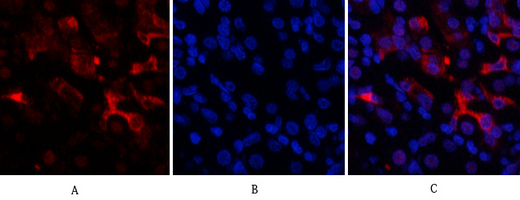
- Immunofluorescence analysis of human-stomach tissue. 1,Bcl-6 Polyclonal Antibody(red) was diluted at 1:200(4°C,overnight). 2, Cy3 labled Secondary antibody was diluted at 1:300(room temperature, 50min).3, Picture B: DAPI(blue) 10min. Picture A:Target. Picture B: DAPI. Picture C: merge of A+B
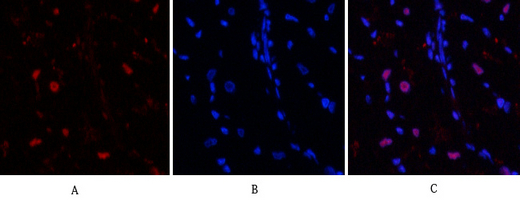
- Immunofluorescence analysis of rat-heart tissue. 1,Bcl-6 Polyclonal Antibody(red) was diluted at 1:200(4°C,overnight). 2, Cy3 labled Secondary antibody was diluted at 1:300(room temperature, 50min).3, Picture B: DAPI(blue) 10min. Picture A:Target. Picture B: DAPI. Picture C: merge of A+B
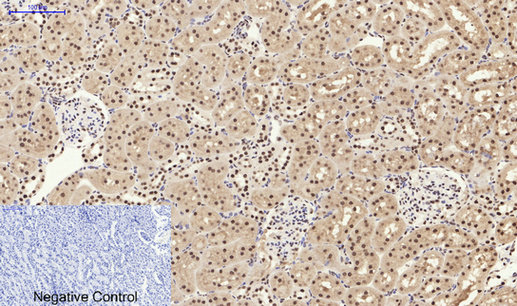
- Immunohistochemical analysis of paraffin-embedded Rat-kidney tissue. 1,Bcl-6 Polyclonal Antibody was diluted at 1:200(4°C,overnight). 2, Sodium citrate pH 6.0 was used for antibody retrieval(>98°C,20min). 3,Secondary antibody was diluted at 1:200(room tempeRature, 30min). Negative control was used by secondary antibody only.
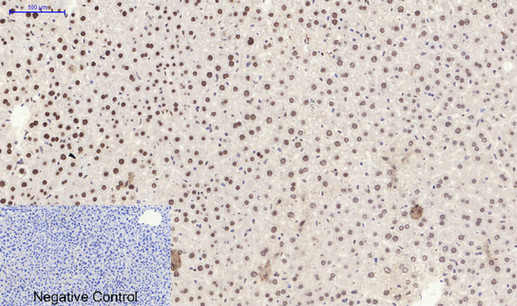
- Immunohistochemical analysis of paraffin-embedded Mouse-liver tissue. 1,Bcl-6 Polyclonal Antibody was diluted at 1:200(4°C,overnight). 2, Sodium citrate pH 6.0 was used for antibody retrieval(>98°C,20min). 3,Secondary antibody was diluted at 1:200(room tempeRature, 30min). Negative control was used by secondary antibody only.
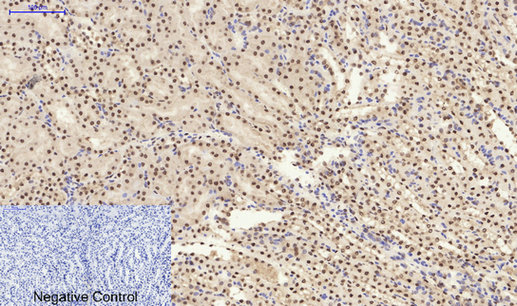
- Immunohistochemical analysis of paraffin-embedded Mouse-kidney tissue. 1,Bcl-6 Polyclonal Antibody was diluted at 1:200(4°C,overnight). 2, Sodium citrate pH 6.0 was used for antibody retrieval(>98°C,20min). 3,Secondary antibody was diluted at 1:200(room tempeRature, 30min). Negative control was used by secondary antibody only.
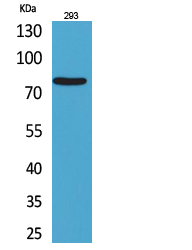
- Western Blot analysis of 293 cells using Bcl-6 Polyclonal Antibody. Antibody was diluted at 1:1000. Secondary antibody(catalog#:RS0002) was diluted at 1:20000 cells nucleus extracted by Minute TM Cytoplasmic and Nuclear Fractionation kit (SC-003,Inventbiotech,MN,USA).
.jpg)
- Immunohistochemical analysis of paraffin-embedded human-liver, antibody was diluted at 1:100

- Western blot analysis of lysate from 293 cells, using BCL6 Antibody.



